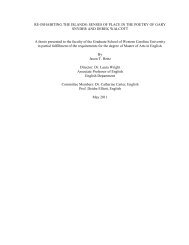SUMMERS, KAREN CRADY, Ph.D. Reading Incest - The University ...
SUMMERS, KAREN CRADY, Ph.D. Reading Incest - The University ...
SUMMERS, KAREN CRADY, Ph.D. Reading Incest - The University ...
You also want an ePaper? Increase the reach of your titles
YUMPU automatically turns print PDFs into web optimized ePapers that Google loves.
50<br />
epilogue that acts as a prayer for Britain. 14<br />
It is also a history of incest. Genius gives an<br />
account of the Creation and the Fall and in doing so tells explains why the first<br />
‘marriages’ were incestuous, and why this was acceptable then and not now. 15<br />
Amans<br />
denies ever feeling incestuous desires:<br />
Mi fader, nay, god wot the sothe,<br />
Mi feire is noght of such a bothe,<br />
So wylde a man yit was I nevere,<br />
That of mi ken or lief or levere<br />
Me liste love in such a wise (VIII.169-73)<br />
<strong>The</strong> short tales in book eight of Caligula, who “of his oghne Sostres thre / Berefte the<br />
virginite” (VIII. 136-7) and Amon, who slept with his sister Tamar, end with their<br />
destruction. Caligula lost his empire and his life through the ire of God, and Amon’s<br />
incest led to his death at the hand of his brother Absolom. <strong>The</strong>se unkynde sins are<br />
mitigated in kynde fashion: the punishment fits the crime, in reasonable fashion, and<br />
incest is, simply, a destructive and harmful act. Amon and Caligula do not have youth<br />
and innocence as do Canace and Machaire. As mature, experienced men they would be<br />
expected to have already learned self-governance and because they have not, they are<br />
destroyed. <strong>The</strong> message is clear: little sympathy may be extended to those who<br />
consciously and deliberately act in unkynde ways, and kynde is an outcome of the process<br />
of reason. How safe can Rome be when there is such a ruler as Caligula? <strong>The</strong> third<br />
14 As there are at least two versions of the Prologue, so are there two conclusions to the poem. In the 1390<br />
version that was dedicated to Richard, the poet prays that Richard will rule with universal justice. In the<br />
later version, dedicated to Henry, the prayer is dedicated to the welfare of England with the hope that<br />
Henry and all men will practice good self-government so that the nation will find peace in a shared vision<br />
of righteousness.<br />
15 I have detailed this account in my Introduction. Also see pp. 44-5.
















